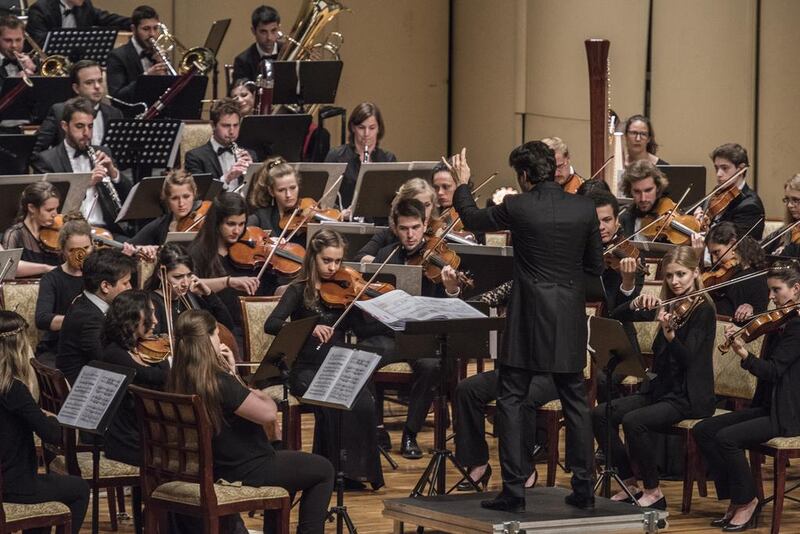The Gustav Mahler Youth Orchestra’s stay in Abu Dhabi began with a performance that could have been no newer, or more novel — and ended with a work which could not be more famous, or familiar.
Enjoying a three-week residency in the emirate, the German ensemble's first task was to present the world premiere of Emirati composer Faisal Al Saari's Zayed's Dream, an unprecedented experiment in combining Khaleeji musical traditions with a Western orchestra, presented in the style of an oud concerto. The groundbreaking piece received a glorious unveil overlooking the Louvre Abu Dhabi, at an official pre-opening concert on March 16, was a symbolic exchange which also saw the premiere of leading French composer Bruno Mantovani's excellent symphonic poem Once Upon a Time.
Following a second concert in Al Ain on March 24, the 120-piece ensemble's third and final UAE engagement, at Emirates Palace on Saturday night, closed with a magnificent reading of Beethoven's Fifth Symphony — among the most iconic, best-loved and best-known pieces of classical music ever written.
A visceral wave of shivers cast over the audience as the unmistakable four-note introductory motif — da-da-da-duuh, de-de-de-duuuh — sounded out. Taken at an energetic pace, perhaps faster than many common readings, David Afkham conducted without a baton but with rock star theatricalism, exploiting the size of the orchestra to mark the first movement’s dynamic contrasts. Throughout, the young players rocked loudly in unison, with the sense of dragging an epic warhorse up an almighty hill.
"Bravo" yelled one audience member, loudly, 40 minutes later, as the final thunderous round of notes echoed across the enraptured auditorium. The musicians received a heroes' farewell, but the real applause was for Beethoven's composition itself. The inherent tension at the heart of his best work — between human, worldly drama and discontent, and transcendent glory and triumph — found few better expressions than in the fabled Fifth.
But arguably, it was the earlier part of the programme that challenged the musicians most — and certainly asked more of the audience. The evening opened with French modernist Henri Dutilleux's 1965 composition Métaboles, a dense, expansively economic mood meditation, which passes the melodic focus through the orchestra to a rich and rewarding effect.
The lion’s share of the programme offered the audience a chance to better acquaint themselves with the works of Béla Bartók, performing two pieces by the great 20th century Hungarian talent.
German guest soloist Frank Peter Zimmermann tackled the solemn, posthumous Violin Concerto 1 with understated, unassuming poise, his straight fringe flopping foppishly as he flitted through the most virtuosic of passages.
More compelling was 1936's masterpiece Music for Strings, Percussion and Celesta, an unnerving and ethereal four-movement work which demands and rewards in equal servings. The unusual use of the piano-like celesta often gave the music a dreamlike quality, but these were not always sweet dreams. Only the final, folksy movement offered some resolution and reward, winding back the clock to playfully reference the typical histrionics of the Romantic age.
Throughout both pieces one was struck by just how great Bartok’s talents were. Caught temporally at what would turn out to be a pivotal fissure in the history of music, his work excels in its ability to simultaneously electrify the mind, and pull at the heartstrings. To retain the essentially expressive, emotive core of 19th century music, while bringing a technical progress and invention which could be only be found in the 20th.
• Abu Dhabi Classics continues on May 9. For more, visit abudhabiclassics.ae
rgarratt@thenational.ae





